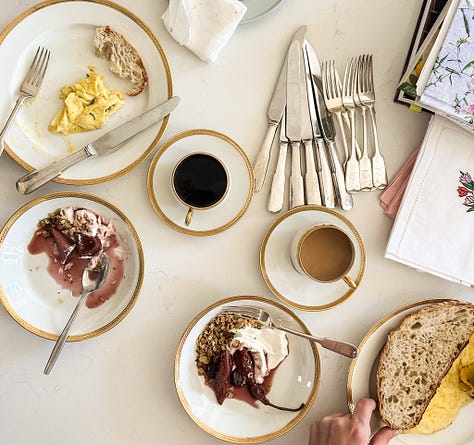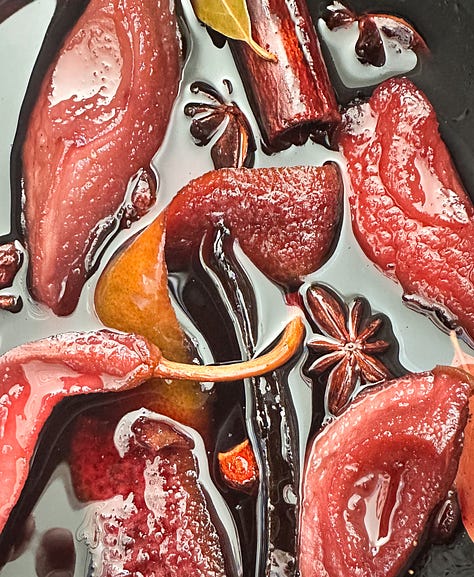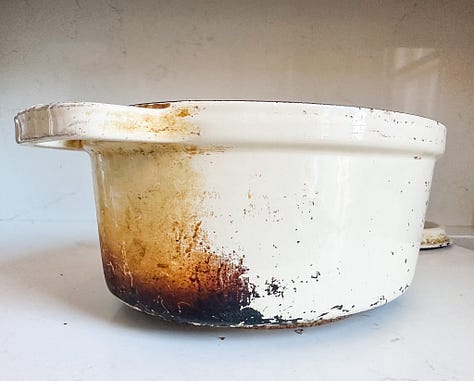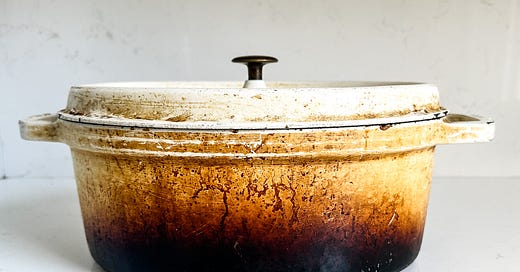Twenty-four years of baked-on char, that’s what’s coating our Staub cocotte. The enamel pot used to be the colour of clotted cream and crowned with a sparkling brass handle. Now it’s a scorched ombré, a deep black fading to marbled amber.
The pot was a wedding gift, carried on a flight from France to Canada by our cousin. Sitting with a large oval pot at her feet was worth it, she said. Everyone needs a cocotte. It sets you up for life.
The cocotte came out last weekend. I was hosting a brunch book club of sorts, where the assignment was to bring a favourite cookbook and tell us why you love it. I imagined it would be like the scene in The Guernsey Potato Peel Pie Society, when Lily James’s character stands in front of the society and pitches her book in the allotted two minutes. She performs, she exudes, she extols, and when the timer dings, she sits down, breathless. We didn’t set a timer, but each of us did pitch our books passionately. Some of us like to take cookbooks to bed and read them like a book. One leans into anti-inflammatory recipes to soothe achiness. One likes old Jane Grigson paperbacks. Another brought a battered copy of The Joy of Cooking. I pulled out Carter’s Cookbooks for their subtle elegance and comforting recipes, and Skye Gyngell’s A Year in My Kitchen for the way she builds dishes from her toolkit of recipes. Another adores the words of Bee Wilson so much so that she printed off her favourite quotes from The Secret of Cooking: Recipes for an Easier Life in the Kitchen, handed them out and we each read one aloud:
“It doesn’t matter how authentic or healthy or otherwise virtuous a dish is if you don’t like it.”
“Cooking eggs is the closest that most of us will ever come to performing magic.”
“Pots and pans are like friends. Try to pick the ones that are so lovable you will forgive them when they let you down.”
“An easy meal made by a relaxed person is better than an elaborate meal cooked in a state of stress.”
“Consider cooking not as a problem but as a remedy, and it becomes easier to find the motivation to do it.”
“Apologizing for its shortcomings never made a meal taste better.”
As the quotes were shared we sipped hot coffee, ate Aimée’s omelettes and slices of Michelle’s still warm sourdough, Rebekah’s delicate roasted potato roses and Mia’s asparagus tart baked served with slivers of tarragon leaves. I spooned Greek yogurt into a bowl a served it alongside granola and pears poached in red wine1, cinnamon, star anise and strips of orange peel. I love dessert at breakfast.
I poached the fruit in our charred cocotte and left the pot on the stove in the midst of the festivities. I’m not the kind to apologize for the pot’s shortcomings. At one point in the chaos one of the group, a creative, endlessly energetic sourdough maker kindly said, “you know Linds, you can bring that pot back to life with a little Bar Keepers friend and a scouring pad.” I once left the pot in the oven during a self cleaning cycle. The high temperatures incinerate a dirty stove, and it does the same for an enamel pot. But it left me wondering, is 900F too much for this special wedding gift? I never did it again.
That afternoon in the quiet of the kitchen I washed the dishes, packed up the leftovers, wrestled around under the sink until I found steel wool and a bottle of Bar Keepers Friend, and gloved up.
Inch by inch, scrubbing in a circular motion, I removed years of char baked onto the side of the pot that mark the meals we’ve made. His countless curries. The braised lamb shanks he turns into shepherd’s pie. The bolognese that he makes with a mixture of ground beef and breakfast sausages from the grocery store, the kind that gross me out a little but I don’t say anything because I love that he makes it for us. The fish pies. The chicken soups, the browned beef for stew that sizzle and splash all over the stove. Poached pears. West Street. Compayne Gardens. Mildmay Grove South. South Street. York Street. Morris Street.
Halfway through the scrubbing I sat down to take a break. A friend told me to soak the pot for a while in hot water and a dishwasher tablet to soften the scorch. I left it overnight. The next day I gloved up again and kept going. It was still hard.
I left the job three-quarters finished and went upstairs. When I came back down James was at the sink, scrubbing. Then he rinsed it, dried it with a tea towel and set it on the stove. We regarded the cream cocotte, speckled gently with tiny remnants of our culinary history. It looked naked, like a skinned cat. “I liked it better before,” he said.








Your cocotte bore evidence of the passage of time, a life well lived, meals savored, love shared and a family built. No scrub brush could ever take that away. All of the “char” remains, even if you cannot see it. And it’s beautiful.
I have a 22 year old Dutch oven of similar make. Like yours it’s blackened and scarred. A gift from my mother part of me wants to try and restore it and indeed I have attempted it with various potions, but today part of me is reassured I should leave it. Let it keep gathering chapters from our kitchen perhaps x